10 Years of Impact and Accompaniment in West Africa
In Liberia and Sierra Leone, PIH celebrates long-term partnership and stronger local health systems
Posted on Jan 8, 2025
As we celebrate and reflect on Partners In Health’s (PIH) decade of work in West Africa, it’s clear that we’re closer to achieving health equity. Looking back at where we began to where we are now is a reminder of what’s possible with accompaniment and long-term partnership.
By working alongside local communities and the Sierra Leonean government, we’ve supported the country in cutting the maternal mortality rate by more than half. That was made possible through significant improvements to care for women and their families, including the following achievements between 2020-2023:
- 55% increase in women who gave birth at PIH-supported Koidu Government Hospital (KGH)
- 111% increase in women starting a new family planning method at PIH-supported Wellbody Clinic
- 219% increase in prenatal care visits at Wellbody Clinic
In partnership with the Liberian government, we revitalized the health system in the most remote communities and the country at large. Together, we've strengthened primary care, notably by training and hiring community health workers (CHWs), who screen patients for various diseases, and refer—and often accompany—them to the hospital.
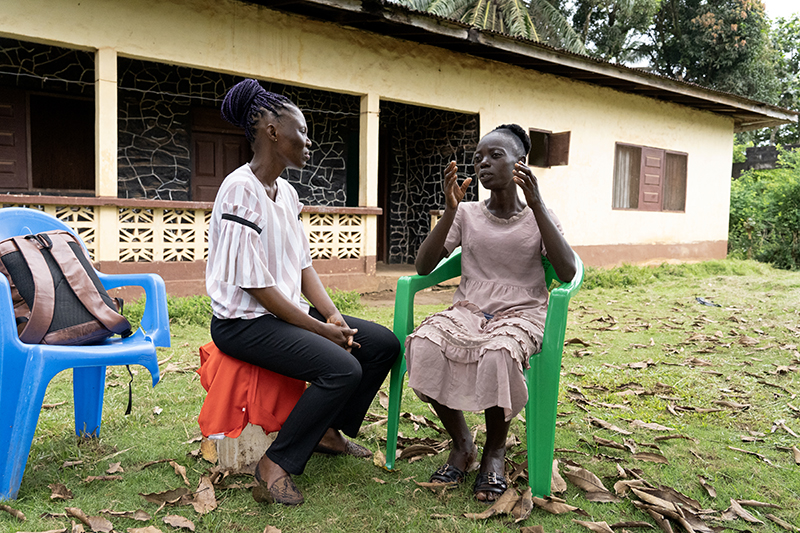
Between 2019-2023, CHWs in Liberia completed 171,693 home visits. Those visits and referrals include tuberculosis (TB) treatment, in which PIH has become a nationwide leader, and recently, pioneered artificial intelligence-based testing leading to a 92% treatment success rate in 2021. Other notable successes in TB care include the following between 2019-2023 in Liberia:
- 6,686 TB tests performed across PIH-supported facilities
- 3,682 patients started on TB treatment
Ten years ago, it was hard to imagine such progress in a region that—at the time—was struck by Ebola, a highly contagious and infectious disease with historically high death rates. Back then, an Ebola diagnosis was a death sentence. Thankfully, the epidemic was contained, and health systems are now stronger.
Launching an Ebola Response
In the summer of 2014, the governments of Liberia and Sierra Leone reached out to PIH for urgent support in responding to Ebola. At the time, PIH leadership and clinicians had no experience treating the virus, nor did we work in West Africa. Despite that, late PIH Co-founder Dr. Paul Farmer knew PIH’s then decades-long experience in battling infectious diseases globally could help end the Ebola epidemic.
In October 2014, PIH’s work began in Liberia and Sierra Leone.
Anticipating many challenges, we were fueled by a simple belief: health care is a human right. We also knew that Ebola’s rapid spread and deep impact were symptoms of weak health systems shaped by decades of injustice: colonialism, the trans-Atlantic slave trade, and civil war, to name a few, in both countries.
“Across West Africa, weak health systems are a legacy of colonial rule, which, promises and propaganda aside, knew few successes in public health—and almost none in providing medical care for the natives,” Farmer wrote in Fevers, Feuds, and Diamonds: Ebola and the Ravages of History.
Such injustices allowed the Ebola outbreak to become the largest and deadliest in recorded history—with more than 28,000 people sickened and 11,000 deaths.
“We all realized that those deaths couldn’t be attributed to Ebola alone,” says Dr. Maxo Luma, PIH Liberia’s executive director. “And we refused to accept that as an organization.”
PIH began treating patients in collaboration with local ministries of health. In Liberia, the government directed PIH to Zwedru and Harper, two of the most underserved cities in the country. Harper, a remote coastal community in Maryland County, was lined with abandoned buildings, remnants of the war that ended a decade prior and home to J.J. Dossen Memorial Hospital. The aftermath of the war was also present in Port Loko and Kono Districts—where PIH was invited to provide care and support in Sierra Leone out of Ebola Treatment Units (ETUs) and existing health facilities.
As the death toll rose, international response remained slow and inadequate. Rightfully outraged by this, Farmer and other PIH leaders knew they needed to act fast.
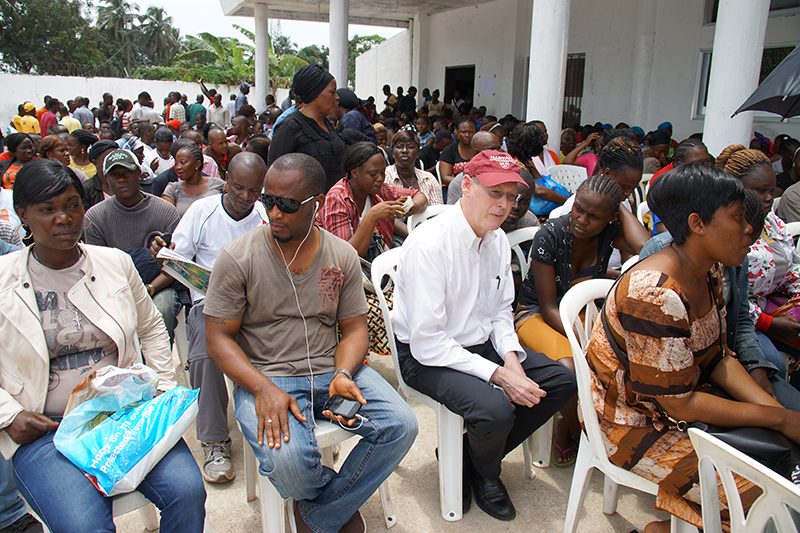
First step: recruit staff.
“We had clinicians from Haiti who were there helping us. People in Mexico and Peru, who this wasn’t impacting them, but they were in solidarity to people who were suffering and knew that’s what we did best. Even if they couldn’t go, they were supporting behind the scenes to take care of other things,” says PIH CEO Dr. Sheila Davis, who served then as chief of Ebola response.
“It was never a question that we should go and that everyone would pick up the slack,” adds Davis, “as many staff were needed immediately to provide logistics, operational, and on-the-ground support.”
In the months ahead, PIH trained and deployed 200 volunteer clinicians from the United States and hired 2,000 community health workers (CHWs) and support staff across Liberia and Sierra Leone.
'They stopped ... but PIH continued'
Nurses, doctors, CHWs, and other staff were working across both countries, night and day, doing whatever it took to get patients well again. As Ebola ravaged through communities, killing hundreds of health care workers, those who survived remained committed to providing services.
In Liberia, PIH leaders and staff arrived in September to find the outbreak had mostly affected the capital of Monrovia and largely spared remote communities, such as those in Maryland County. While they worked with government partners to establish infectious disease prevention protocols, they also toured facilities, such as J.J. Dossen Hospital and nearby Pleebo Health Center, to assess where they could help provide care.
What they found was shocking: One general doctor was charged with leading J.J. Dossen’s administration and providing all specialized care.
PIH’s mandate gradually shifted from responding to a (now waning) outbreak, to supporting a health system that was in severe shortage of skilled staff.
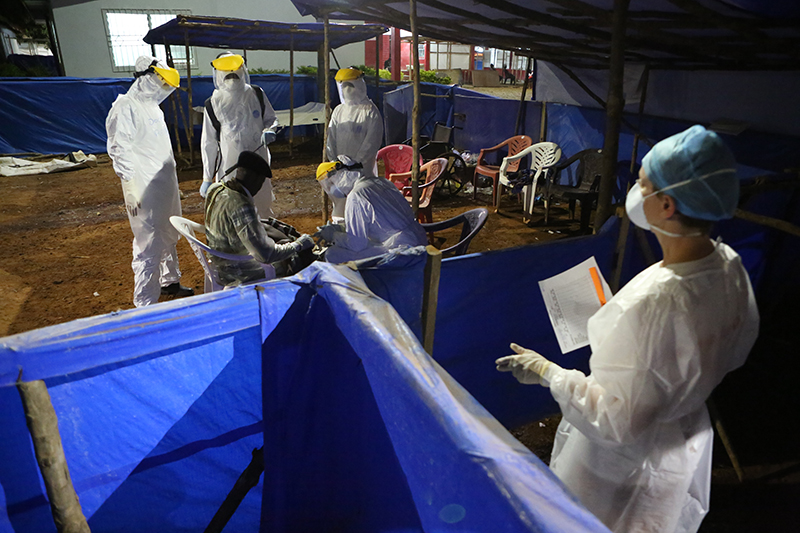
Meanwhile in Sierra Leone, PIH-trained clinicians rotated in long shifts through ETUs in the capital of Freetown and more remote Port Loko and Kono districts. They focused on finding quicker ways to provide rapid rehydration to patients—key to treating a disease like Ebola—and moved from oral solutions to IVs. It was a risky move for caregivers, given transmission was through contact with contaminated fluids like blood, but it was lifesaving for many. All told, roughly 4,000 survivors left PIH-supported ETUs and returned home.
At Port Loko, each survivor who left the facility tied a ribbon made of local fabric to what became known as the “Survivor Tree.” The tree, now several meters tall, stands there, with remnants of fabric clinging to the highest branches. Many survivors still work for PIH Sierra Leone today, a decade later..
“When I initially went to the ETU, I was scared,” Mohamed Nao, an Ebola survivor turned PIH employee who’s known by colleagues as “Chairman,” reflects a decade after being discharged from an ETU. “When people started talking to us … giving us medication, taking care of our affairs and cleaning up ... Until that time I actually feel confidence that, ‘Yes, I am okay. I’m safe where I am.’”
Nao, 20, remained in the ETU’s male ward for 21 days. Then came October 5, 2014.
“Whenever I remember that day, I feel joy,” he says. “That was the day I survived.”
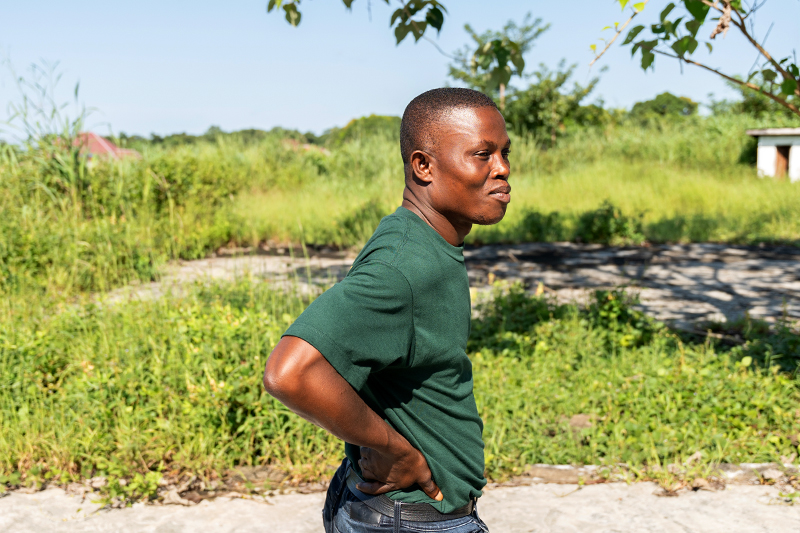
Less than two years later, the epidemic was officially declared over, and large, well-funded aid organizations quickly left the region.
“They stopped giving us support, but PIH continued,” says Nao.
Unfamiliar with PIH at the time, he distinctly remembers the ongoing assistance in the form of social support: bags of rice, monthly stipends, educational assistance, and more. Since late 2014, Nao has worked as a social support and patient referral coordinator for PIH Sierra Leone, coordinating services from start to finish for survivors of Ebola and TB. On a regular basis, he communicates with PIH clinicians to discuss patients’ needs, visits schools to coordinate school supplies and fees, and visits patients in their homes.
Committed to long-term health system strengthening, PIH remains in West Africa. As other organizations left, PIH believed staying was the morally right decision, the best way to prevent future outbreaks, and the means to rebuilding the local health system.
Building Health Systems: A Holistic Approach
Over the past 10 years, PIH has worked with government partners to strengthen key elements known as the “five S’s”: staff, stuff, space, systems, and social support. With significant improvements in each area, health systems have become more reliable and resilient across West Africa.
“The value of accompaniment to our partners and patients means meeting them where they are in their journey and walking together from start to finish,” says Vicky Reed, PIH Sierra Leone’s executive director.
In Sierra Leone, PIH’s commitment to maternal health began from the moment we arrived, when we established one of the first maternal ETUs in Freetown. By safely isolating woman in labor from those with Ebola—who often experience the same symptoms—clinicians could provide appropriate care, while addressing common causes of maternal death, such as eclampsia. Across the country in rural Kono District, KGH was still standing when PIH arrived, despite the facility being in the epicenter of the civil war. However, it lacked electricity, running water, and other vital resources to deliver high-quality services. It was the only hospital in the region, but many patients avoided it because of its poor reputation. Today, KGH is adequately equipped to support expectant mothers—from pre- to post-natal care—and draws patients from around Sierra Leone and neighboring countries.

To date, thousands of babies have been safely delivered at KGH; and between 2020-2023, there was a 44% increase in lifesaving C-sections and a 51% increase in live births. Now, the facility is nationally recognized as a model hospital.
As we continue to advance women’s health, one of our most comprehensive projects is underway: the Maternal Center of Excellence (MCOE). As an expansion of KGH, the MCOE is a state-of-the-art teaching and referral hospital, which broke ground in April 2021. It will increase the availability of quality care for women and children and serve as an innovation hub for clinical training and research, creating a global platform of expertise that can deliver resources for improving women’s health worldwide.
In addition to improvements at KGH, PIH has achieved many other milestones in Sierra Leone over the past decade:
- opened the country’s first multidrug-resistant tuberculosis program at Lakka Government Hospital outside the capital;
- transformed Sierra Leone Psychiatric Teaching Hospital into a formally accredited facility, where clinicians provide dignified care and train future generations of mental health care providers;
- pioneered an electronic medical records system at Wellbody Clinic, while serving as a model of primary health care delivery, training, and innovation.
Always a Partnership
Simultaneously in Liberia, growth over the past decade is visible across the health care system—from basic primary care to lifesaving surgery. Since PIH’s arrival in the country, our strong integration and partnership with the Liberian government has enabled dramatic changes.
“Partners In Health went the extra mile in assisting our health sector,” says George A. Prowd, former superintendent of Maryland County, Liberia, noting PIH’s role in training and educating nurses and renovating existing infrastructure. “Sometimes if you try to reflect your mind far back as to the period before PIH and you start to wonder: ‘What if Partners in Health did not come? What would things have been like?’”
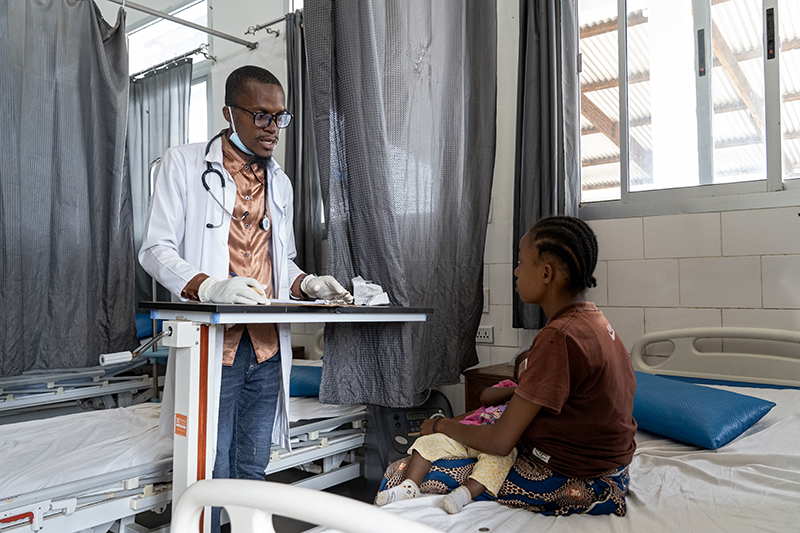
Together with government partners, PIH Liberia has made access to high-quality medical services in Maryland County a reality. At J.J. Dossen, we opened the first and only multidrug-resistant tuberculosis ward outside of Monrovia, the country’s capital. Committed to the next generation of health care workers, we’ve launched a family medicine residency for physicians at J.J. Dossen, and we’ve supported students enrolled in bachelor’s programs in nursing, midwifery, and public health at Tubman University, the only university in southeastern Liberia.
When Tubman University’s President, Dr. Olu Q. Menjay, arrived and toured the campus for the first time, he was discouraged by the poor infrastructure. Then, he entered a modern room. It was air-conditioned and lined with comfortable chairs, wooden desks, and new computers equipped with e-libraries.
“That room provided me hope at Tubman University. And that room was funded by Partners In Health,” says Menjay. The vibrancy of the University’s College of Health Sciences would not have been possible without the support of PIH, given the limited budget allocations from the Government of Liberia, he adds.
Guided by the firm belief that everyone deserves the best care possible, PIH will continue to work with partners and local communities to fight for health as a human right in West Africa, over the next decade—and beyond.
“As we look at pushing the envelope on health equity ... what are these other things that are happening that are going to cause transformation? That’s driven by leaders on the ground,” says Davis. “We have 19,000 people around the world and it’s very driven around what’s best for their communities. We’re there to support, but they’re driving it.”

